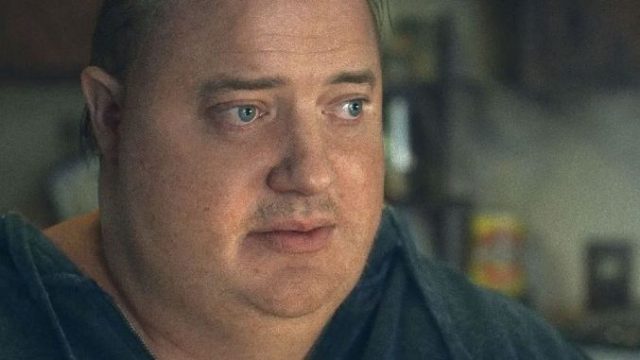Charlie (Brendan Fraser) is a remote college English teacher with severe obesity that keeps him bound to his home. The first time we see Charlie is at the finish of a fierce bout of masturbation to gay porn. His self-pleasuring session ends with the arrival of a very surprised missionary named Thomas (Ty Simpkins) and a heart attack. It’s a hell of a first impression for both Thomas and us, simultaneously revealing Charlie’s girth and homosexuality in a frank way that risks making a sideshow of both.
One can lay several faults on The Whale, but timidity isn’t one of them. The prosthetic makeup job on Fraser to turn the one-time action idol into a 600-pound man has the potential to turn the movie’s single set into a freak show tent. It’s an uncomfortable mode that the movie almost avoids and doesn’t entirely want to. It’s not the fault of the movie that almost all other movies use obesity almost exclusively for pitiable comic relief. But on the other hand, Charlie’s weight is the only distinguishing element of the movie. His self-destructive binges would feel less like center ring stunts if anything going on with the other characters that flit in and out of Charlie’s apartment made an impression to rival Charlie choking on a meatball sub.
Charlie is, we come to realize, committing slow suicide. An untreated heart condition, brought on by his excessive weight and exacerbated by a regiment of fried chicken buckets, delivery pizza and a drawer full of candy bars, has brought him to the last days of his life. He leaves daily food for a crow outside his window, an act he as a lover of literary essays must recognize as painfully on-the-nose. He reaches out to his estranged teenage daughter Ellie (Sadie Sink of Netflix’s Stranger Things and Fear Street) in an attempt to reconnect after leaving her and her mother years ago for a younger man. Ellie is flunking high school, including Charlie’s favored subject of English. In spite of Ellie’s flashes of sadism, Charlie sees her as a wonderful young pupil and offers her his life savings and to help with her failed essay assignments.
The Whale is based on the play by Samuel D. Hunter – a very bad play if his screen adaptation is an indication. Outside of Charlie, the story hinges on the development of Ellie, a thoroughly unpleasant girl in a performance that Sink calibrates for the stage rather than the camera. She’s inherited from her mother (Samantha Morton in a brief appearance) a penchant for cruel lines of questioning that she then denies as cruel. Charlie – very generously – admires her feisty honesty, but for us the dialog is dramatically frustrating and structured to deliver insight or cleverness that never comes. Charlie’s only other friend, a nurse named Liz, has a complicated relationship with him that sees her literally saving his life but unable to save his future as Charlie refuses outside help. She’s played ably by Hong Chau, and between this and The Menu it’s encouraging to see her in strong roles after it looked like Downsizing had squandered her talent years ago.
The script is built on undercooked characters and symbolism that Charlie’s 101 classes would find facile (when one character near the invokes the whale in Moby Dick and suddenly looks at Charlie in a new way, one wonders if Hunter and Aronofsky hoped to steal some of the audience from the Avatar movie next door). Yet it’s easy to see where it appeals to Aronofsky who considered human Thanatos in Requiem for a Dream and The Wrestler and weighed the role of religion at the end of all things in Noah and mother! Multiple characters, including Charlie’s deceased lover, share a connection to the nearby New Life Church which claims that the end of the world is nigh and in its earlier, better moments The Whale asks us to consider the way our own feelings about the end of existence can hasten its arrival. Aronofsky has previously worked without his trademark camera tricks that he brought since his earliest days and found success in more subdued modes. But The Whale is a shockingly stagey adaptation for a director whose work has always produced visceral experiences. Aronofsky found his way into twin minds of God in mother! but has little to make the drama here pop.
The best thing the director does is have the courtesy to give the characters space to exist in their frailty and faults, declining to comment further with his camera. Still, by the end only Fraser overcomes the phony machinations of the script, playing soulful, hurt and at times a little playful in a role that invites him to be pitiful in every scene. Charlie demands the truth in writing from his students and his daughter, and the script could have used his oversight, too. The movie has honesty but it’s buried under artifice.


